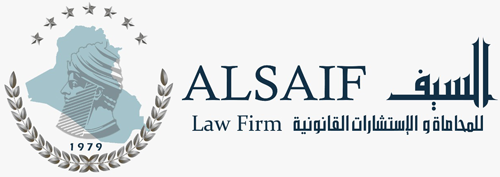Trademark Law Firm in Iraq
How to register a Trademark in Iraq?
Protection of Property Rights
The GOI is in the process of developing a new intellectual property rights (IPR) law in line with the WTO Agreement on Trade Related Aspects of Intellectual Property Rights (TRIPS), but the exact structure of this and related legislation is still being determined. IPR functions are currently spread across several ministries. The patent registry and industrial design registry remain a part of the Central Organization on Standards and Quality Control (COSQC), an agency of the Ministry of Planning and Development Cooperation. Copyrights are under the Ministry of Culture, and trademarks under the Ministry of Industry and Minerals. The GOI's ability to enforce intellectual property rights laws.
Iraq is also a member of several international intellectual property conventions, and of regional or bilateral arrangements which include:
• Paris Convention for the Protection of Industrial Property (1967 Act) ratified by Law No. 212 of 1975.
• World Intellectual Property Organizations (WIPO) Convention; ratified by Law No. 212 of 1975. Iraq became a member of the WIPO in January 1976.
• Arab Agreement for the Protection of Copyrights; ratified by Law No. 41 of 1985.
• Arab Intellectual Property Rights Treaty (Law No. 41 of 1985).
An application for the registration of a mark shall be field with the Registrar in the manner and according to the conditions prescribed in regulation made under this law.
A mark shall be permitted to be registered in respect of one or more articles or in one or more classes of the products in the schedule of classification of goods annexed to the regulation made under this law.
Where before any publication is made two or more persons apply simultaneously for the registration of the same mark or of identical or similar marks in respect of goods or articles of the same class of products, the Registrar may suspend all such applications until the production to him of a renunciation by the disputants in favor of one of them dully attested or a final judgment from the court.
The Registrar may impose limitations or modifications as he may deem necessary for the better specification, description, mode or place or user of the mark, or such other matters, for preventing confusion with any other mark already registered, or for any other reason as he may think fit. In case of refusal or conditional acceptance, the Registrar shall notify the applicant, in writing, of the grounds, of his decision and of the relevant facts. If the applicant shall not, within thirty days, comply with the limitations imposed by Registrar he shall be deemed to have abandoned his application.
Filing Requirements
• Power of attorney legalised by the Iraqi Consulate. The legalisation stamp must appear on the back page of the document.
• Legalised copy of the priority document if claimed.
Notes
Iraq follows multi-class filing system and each class is divided into sub-classes. Additional government fees of US$75 are applicable for each additional sub-class regardless to the number of classes.
Renewal Requirements
• Power of attorney legalised by the Iraqi Consulate.
Search Requirements
• No documents are required.
Assignment Requirements
• Power of attorney signed by the assignee, legalised by the Iraqi Consulate.
• Deed of assignment document, legalised by the Iraqi Consulate.
Merger Requirements
• Power of attorney legalised by the Iraqi Consulate.
• Merger agreement document signed by both parties, legalised by Iraqi Consulate.
Recordal of Change
• Power of attorney reflecting the new name or address, legalised by the Iraqi Consulate.
• Certificate of change legalised by the Iraqi Consulate.
License Requirements
• Power of attorney signed by the licensee, legalized by the Iraqi Consulate. The legalization stamp must appear on the back page of the document.
• License agreement document signed by both parties, legalized.
Overview of the Trademarks Law in Iraq
This law was replaced with the Trademarks and Commercial Data Law No. 21 of the year 1957. In 2004, the Coalition Provisional Authority (“CPA”) issued order No. 80 which amended the aforementioned law and renamed it the Law of Trademarks and Geographical Indications (“the Trademarks Law”).
Iraq is a member of the Paris Convention for the Protection of Industrial Property (1967 Act) which was ratified by Law No. 212 of 1975. Furthermore, Iraq is a member of the World Intellectual Property Organizations (WIPO) Convention; ratified by Law No. 212 of 1975. Iraq became a member of the WIPO in January 1976.
However, Iraq has yet to become a permanent member of the WTO and one of the commitments of Iraq as a condition for its accession to the WTO is the enactment and implementation of legislation that complies with the WTO Agreement on Trade Related Aspects of Intellectual Property Rights (TRIPS). There is currently a draft Trademarks Law being discussed in Iraq which shall be in compliant with the TRIPS Agreement, however, it is not clear when this law will be enacted.
Trademark infringement, and counterfeiting in particular, has increased in Iraq over the last decade which is in part due to the political unrest in the country. However, with Iraq trying to build its economy and become more open to international trade, brand owners have become more vigilant and willing to protect their trademarks rights in Iraq. This article will provide an overview of the protection and enforcement of trademarks as provided by the Iraq Trademarks Law.
Trademark is defined according to the Trademarks Law as any sign, or any combination of signs, capable of distinguishing the goods of one undertaking from those of other undertakings, capable of constituting a trademark. The sign could be words including personal names, letters, numerals, figurative elements and colors as well as any combination of such signs. The Law went further to accept registration of signs that are not inherently distinctive but acquired distinctiveness through use. Furthermore, it is not required that the signs be visually perceptible in order to be eligible for protection as trademarks, which opens the door for registration of non-traditional trademarks, such as smell.
The Trademarks Law provides for a separate definition for Service Trademark as any sign, or any combination of signs, used by a person to identify and distinguish the services of one person, including a unique service, from the services of others and to indicate the source of the services. The law included titles, character names, and other distinctive features of radio or television programs as service marks that could be registered.
Trademarks are registered with the Trademark Registration Office at the Ministry of Industry and Minerals in Baghdad. However, in 2011 the Ministry of Trade and Industry in Kurdistan started its own registration system which covers Kurdistan Province. This has caused a conflict with the registrations made at the Trademark Registration Office in Baghdad, which shall cover the whole country including Kurdistan according to the Trademarks Law. The Trademark Office in Baghdad requested the State Council to provide an opinion and explanation on the situation to solve the conflict, its decision has yet to be issued.
Therefore, it is currently possible to register in both Baghdad and Kurdistan Offices for the protection of a trademark at the same time, depending on the plans of the brand owner and in which area in Iraq they are planning to conduct business. Despite the fact that the registration with the Baghdad Office covers the whole country, a brand owner wishing to conduct business in Kurdistan may find it prudent to register its trademark in Kurdistan as well, especially given that the registration process in Kurdistan is faster compared to the Baghdad Office.
The duration of protection of a mark shall be for ten years, renewable for like periods.
The protection provided by the Trademarks Law is for registered trademarks, as the law provides that the owner of a registered trademark shall have the exclusive right to prevent all third parties not having the owner’s consent from using identical or similar signs for goods or services which are identical or similar to those in respect of which the trademark is registered where such use would result in a likelihood of confusion. However, well-known trademarks are protected in Iraq even if they are unregistered in the country.
Trademark infringement is a punishable crime according to the Iraq Trademarks Law, which provides for what constitutes a trademark infringement as follows:
1. The counterfeiting of a registered trademark, or imitation of the same in such a manner as to mislead the public, or using a counterfeit or imitated mark with bad intent;
2. Unlawful use of a registered trademark owned by another party;
3. Placing, in mala fide, a registered trademark owned by a third party on one’s products.
4. Knowingly selling or offering for sale or circulating or possessing for the purpose of sale, products which bear a counterfeited or an imitated trademark, or a trademark which is unlawfully affixed; or
5. Intentionally offering or rendering services under a forged, imitated or unlawfully used mark.
The punishment provided by the law is a jail term of not less than one year and not more than five years and/or a fine of not less than 50,000,000 Dinars (USD 42,948) and not more than 100,000,000 Dinars (USD 85,839). In cases of repeated infringements, the punishment will be imprisonment for a period of not less than 5 years and not more than 10 years and/or a fine of not less than 100,000,000 Dinars (USD 85,839) and not more than 200,000,000 Dinars (USD 171,675) in addition to the closure of the commercial store or enterprise for a period of not less than
fifteen days and not exceeding six months, together with the publication of the judgment at the expense of the infringer.
Accordingly, it is possible for the owner of a registered trademark to file a criminal complaint with the Examining Magistrate who, upon examination of the evidence, shall refer the case to the criminal Court.In addition to the criminal complaint, the owner of the trademark may file a civil case before the competent Court, supported by sufficient evidence of the trademark infringement and damages incurred, to claim for compensation. Compensation awarded by the Court shall be adequate to compensate for the injury the trademark owner has suffered as a result of the infringement. In addition, trademark owners may recover the profits of the infringer that are attributable to the infringement.
In either case, whether before or after filing a criminal complaint or a civil case, a trademark owner may petition to the Examining Magistrate or the Court seeking provisional measures, specifically to seize the instruments and tools used in the commission of the offence as well as the products, goods, wrapping materials, papers, hang tags, stickers, etc., which bear the mark of the subject matter of the offence.
Although the Trademarks Law does not provide for border measures against trademark infringements, which would grant the Customs Authorities powers to stop counterfeit goods at the border on its own, it is possible to stop counterfeit goods at borders after obtaining a final Court judgment. Brand owners are holding talks with the Customs Authorities to find a way to deter the flow of counterfeit goods to Iraq.
The Iraq Trademarks Law provides reasonable measures for the protection and enforcement of trademarks. Despite the delays that may occur due to the instability in the country, trademark owners are increasingly seeking registration in Iraq. New actions are being brought against trademark infringements and Iraq has emerged as an important market in which brand owners should protect their rights.

